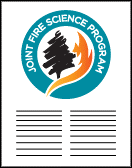United States Joint Fire Science Program

Joint Fire Science Program Research Project Reports
Document Type
Article
Date of this Version
2014
Citation
Project Active ID: 12-3-01-29
Abstract
Understanding the complex mechanisms controlling treeline advance or retreat in the arctic and subarctic has important implications for projecting ecosystem response to changes in climate. Changes in landcover due to a treeline biome shift would alter climate feedbacks (carbon storage and energy exchange), ecosystem services such as wildlife and berry habitat, and landscape flammability. Wildfire frequency and extent has increased in the last half-century in the boreal forest and tundra in response to warmer weather and lower precipitation. Invasion of tundra by trees may be facilitated by wildfire disturbance, which exposes new seedbeds, increases nutrient availability immediately post-fire, and creates opportunities for establishment in an ecosystem where tree recruitment is otherwise rare. Coupled with projects specifically investigating biotic factors influencing tree seedling establishment, we evaluated the regional abiotic factors governing seedling performance and establishment success across treeline after fire. Addressing the Joint Fire Science Program (JFSP) Graduate Research INnovation (GRIN) topic of climate change and fire effects, we investigated regional controls on seedling growth across a latitudinal treeline gradient post-fire in Alaska. We used samples from a tree seedling out-plant experiment and an observational study of naturally established tree seedlings to investigate how establishment success and physiological performance is limited by drought stress and nutrient acquisition across the treeline ecotone. We developed a conceptual model of the abiotic and biotic factors that govern seedling performance at treeline and tundra. This conceptual model has been implemented in ALFRESCO, a landscape-level model of vegetation-fire-climate dynamics. Using ALFRESCO we are investigating the potential for fire-initiated tree migration.
Included in
Forest Biology Commons, Forest Management Commons, Natural Resources and Conservation Commons, Natural Resources Management and Policy Commons, Other Environmental Sciences Commons, Other Forestry and Forest Sciences Commons, Sustainability Commons, Wood Science and Pulp, Paper Technology Commons


Comments
US government work.